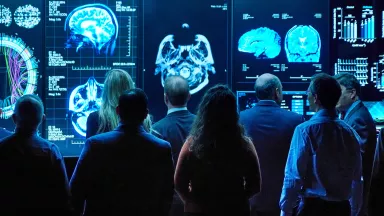What Is HIV-Associated Dementia (HAD)?
Secondary dementias occur in people with disorders that damage brain tissue. Such disorders that can lead to secondary dementias may include multiple sclerosis, meningitis and encephalitis, HIV, as well as Wilson’s disease (in which excessive amounts of copper cause brain damage).
HIV-associated dementia (HAD) is a secondary dementia that can occur in people with human immunodeficiency virus, the virus that causes AIDS. HAD damages the brain’s white matter and leads to a type of dementia associated with memory problems, social withdrawal and trouble concentrating. People with HAD may develop movement problems as well. The incidence of HAD has dropped dramatically with the availability of effective antiviral therapies for managing the underlying HIV infections.
Types of HIV-Associated Dementia (HAD)
This rare condition causes thinking problems for individuals who have been diagnosed with human immunodeficiency virus (HIV). It is one form of a neurocognitive disorder associated specifically with HIV. It affects cognitive skills, thinking and memory.
Causes of HIV-Associated Dementia (HAD)
HIV-associated dementia (HAD) can occur in people with human immunodeficiency virus, the virus that causes AIDS. HAD damages the brain’s white matter and leads to a type of dementia associated with memory problems, social withdrawal and trouble concentrating. People with HAD may develop movement problems as well. The incidence of HAD has dropped dramatically with the availability of effective antiviral therapies for managing the underlying HIV infections.
HAD can be caused directly by HIV or as a result of HIV combined with external factors.
Risk Factors for HIV-Associated Dementia (HAD)
There is no known cure for HIV-associated dementia (HAD), but risk can be minimized by taking prescribed doses of highly active antiretroviral therapy (HAART), a medication regimen used to manage and treat HIV.
Screening for & Preventing HIV-Associated Dementia (HAD)
Like most forms of dementia, HIV-associated dementia (HAD) is typically diagnosed using a mental status test, such as the Montreal Cognitive Assessment (MOCA). The MOCA has been used in HIV-infected individuals and does not measure psychomotor speed or processing, but does measure executive function, attention, language and episodic memory.
The Mini-Mental State Examination (MMSE) is also a common screening tool, a widely used 30-question test used for diagnosis of cognitive impairment.
Signs & Symptoms of HIV-Associated Dementia (HAD)
Symptoms of HIV-associated dementia (HAD) display changes in behavior, movement, thinking skills and mood. Symptoms vary from person to person, and can change from day to day. Some changes may include:
- Trouble thinking or processing
- Problems focusing or paying attention
- Memory loss
- Problems following a conversation
- Inability to recall phone numbers, scheduled appointments
- Difficulty understanding the questions being asked
- Weakness in legs
- Difficulty balancing
- Mood changes, including depression, irritability and disinterest
Diagnosing HIV-Associated Dementia (HAD)
Like most forms of dementia, HIV-associated dementia (HAD) is typically diagnosed using a mental status test, such as the Montreal Cognitive Assessment (MOCA). The MOCA has been used in HIV-infected individuals and does not measure psychomotor speed or processing, but does measure executive function, attention, language and episodic memory.
The Mini-Mental State Examination (MMSE) is also a common screening tool, a widely used 30-question test used for diagnosis of cognitive impairment.
Treating HIV-Associated Dementia (HAD)
There is no known cure for HIV-associated dementia (HAD), but symptoms can be managed. Taking prescribed doses of highly active antiretroviral therapy (HAART), a medication regimen used to manage and treat HIV, is an effective tool for symptom management. Another HIV treatment known as combination antiretroviral therapy (cART) can prevent or delay onset of HAD.
Additionally, lifestyle changes can help with symptoms. The following can improve mood and overall wellness:
- Physical exercise can enhance brain health and improve mood and overall wellness
- A balanced diet
- Limited alcohol
- Plenty of sleep
- Managing other diseases like diabetes, blood pressure and high cholesterol
Living with HIV-Associated Dementia (HAD)
In addition to medication management, lifestyle changes can help with symptoms. The following can improve mood and overall wellness:
- Physical exercise can enhance brain health and improve mood and overall wellness
- A balanced diet
- Limited alcohol
- Plenty of sleep
- Managing other diseases like diabetes, blood pressure, and high cholesterol
With recovery and treatment of all dementia diagnoses, a team of specialists—doctors, nurses and speech, physical and other therapists—familiar with these disorders can help guide patients and their loved ones with care.
A dementia care team may involve neurologists, neuroscientists, psychiatrists and psychologists who will collaborate in order to determine the most appropriate treatment for your individualized diagnosis.
There are also therapeutic modalities that may help with memory and cognitive processes, as well as contribute to an improvement in overall emotional wellness.
Reminiscence therapy sessions can be organized in group format or conducted one on one. This method includes using discussions and memory triggers to help patients reform their memories. Tools like music, souvenirs or treasures from important places and moments in their life are used in this approach.
Cognitive stimulation therapy (CST) is group therapy that stimulates various parts of the brain through activities like word games, cooking, discussing current events and music.
Some dementia patients may benefit from reality orientation training, which involves actions like hanging signs around the home to identify objects and memories or repeating the person’s name, today’s date and the time of day. Additionally, removing clutter from the home and limiting peripheral noises and sensory stimulating appliances like TVs and radios can help those with dementia stay focused. It’s also important to remove or relocate anything dangerous from the home, such as firearms or knives, and to hide car keys.
Lifestyle changes, daily routines and structure also help patients with their morale, as well as overall physical health. Fitness classes or walks for cardiovascular health are always beneficial, as are light activities and pastimes like gardening, dancing or household chores. A diet rich in foods that are good for the brain and healthy sleep habits also contribute to overall wellness.
Working with specialists and occupational and physical therapists can help with maintaining physical movement, address speech and swallowing issues, and help people learn new ways to handle loss of skills with everyday tasks such as feeding oneself. It is important to educate family, friends and caregivers about a loved one’s medical issues. Also, in-person and online support groups available through many disease awareness and caregiver advocacy organizations can give families and other caregivers additional resources, as well as opportunities to share experiences and express concerns.




